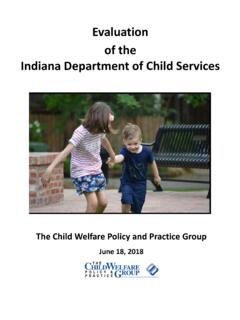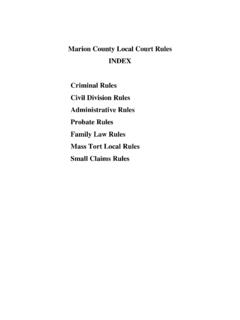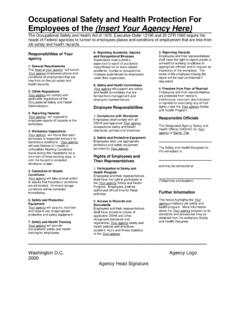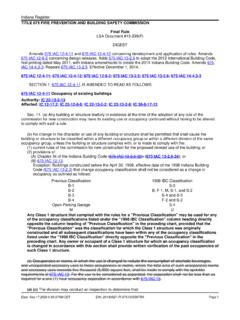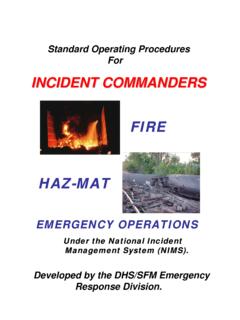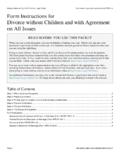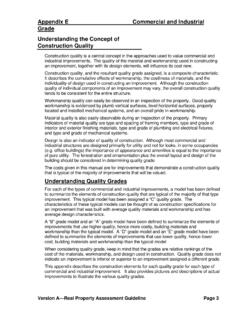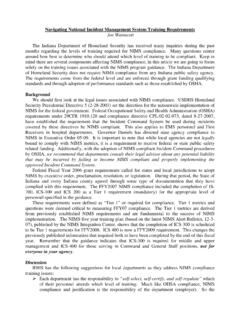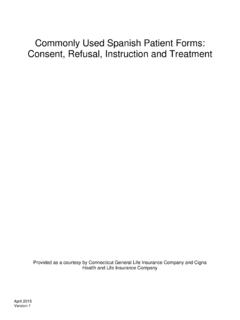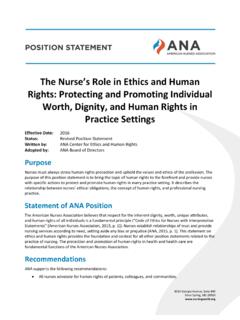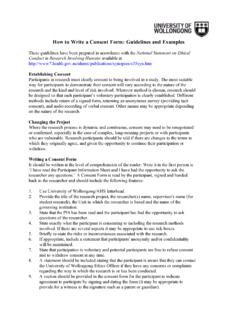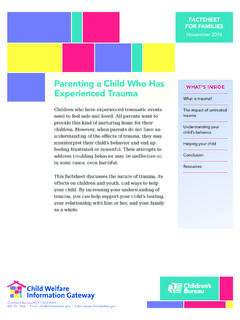Transcription of Refusal to Vaccinate - Indiana
1 Refusal to Vaccinate Child s Name: Child s ID # Parent s/Guardian s Name(s): My child s health care provider, has advised me that my child (named above) should receive the following vaccines: Recommended Declined Hepatitis B vaccine Diphtheria, Tetanus, acellular Pertussis (DTaP) vaccine Diphtheria Tetanus (DT or dT) vaccine Haemophilus influenzae type b (Hib) vaccine Pneumococcal conjugate vaccine Polio vaccine (IPV) Measles, mumps, rubella (MMR) vaccine Varicella (chickenpox) vaccine Influenza (flu) vaccine Meningococcal vaccine Hepatitis A vaccine Other I have read the Centers for Disease Control and Prevention s (CDC) Vaccine Information Sheet(s) explaining the vaccine(s) and the disease(s) they prevent. I have had the opportunity to discuss these with my child s health care provider, who has answered all of my questions regarding the recommended vaccine(s).
2 I understand the following: The purpose of and the need for the recommended vaccine(s) The risks and benefits of the recommended vaccine(s) If my child does not receive the vaccine(s), the consequences may include: -contracting the illness the vaccine should prevent -transmitting the disease to others -the need for my child to stay out of child care or school during disease outbreaks My health care provider, the American Academy of Pediatrics, the American Academy of Family Physicians, and the Centers for Disease Control and Prevention have all strongly recommended that the vaccine(s) be given Nevertheless I have decided to decline the vaccine(s) recommended for my child, as indicated above, by checking the appropriate box under the column titled declined. I know that failure to follow the recommendations about vaccination may endanger the health or life of my child and others that my child might come in contact with.
3 I know that I may re-address this issue with my health care provider at any time, and that I may change my mind and accept vaccination for my child anytime in the future. I acknowledge that I have read this document in its entirety and fully understand it. Parent/Guardian Signature Date Witness Date HE0342 Copyright 2002 9-80 Documenting Parental Refusal to Accept Vaccination All parents and patients should be informed about the risks and benefits of preventive and therapeutic procedures, including vaccination. In the case of vaccination, federal law mandates this discussion. Despite the health care provider s best efforts to explain its importance, some families may refuse vaccination for their children. The use of this or a similar form, demonstrating the importance you place on appropriate immunizations and focusing the parent's attention on the unnecessary risk for which they are accepting responsibility, may in some instances induce a wavering parent to accept your recommendations.
4 In addition to concern for the health of their unimmunized patient, health care providers may be concerned about liability. The American Academy of Pediatrics Committee on Infectious Diseases states: Documentation of [vaccine risk communication] in the patient s record may help to reduce any potential liability should a vaccine-preventable disease occur in the unimmunized patient (American Academy of Pediatrics. Informing Patients and Parents. In: Pickering LK, ed. 2003 Red Book: Report of the Committee on Infectious Diseases. 26th ed. Elk Grove Village, IL: American Academy of Pediatrics; 2003:pages 4 to 6). Health care providers may decide it is in their best interest to formally document a parent s Refusal to accept vaccination for a minor child. This form may be used as a template for such documentation, but should not be considered a legal document and should not substitute for legal advice from a qualified health care attorney.
5 Completion of a form, in and of itself, never substitutes for good risk communication nor would it provide absolute immunity from liability. After completion of this form re-discussion of these issues at another time may still be appropriate. Completion of this form also does not provide a family with exemption from state school or day care entry requirements. This form may be duplicated or changed to suit your and your patients' needs. The Section on Infectious Diseases of the American Academy of Pediatrics Resources The following are some of the resources available to help pediatricians develop a productive dialogue with vaccine hesitant parents and answer questions about vaccine risks and benefits: Web sites 1. AAP s Childhood Immunization Support Program (CISP) Information for providers and parents including Why Should I Immunize My Child?
6 " 2. The Immunization Education Program (IEP) of the Pennsylvania Chapter of the American Academy of Pediatrics Includes answers to common vaccine questions and topics such as Addressing vaccine safety concerns; Evaluating anti-vaccine claims; Sources of accurate immunization information on the web; and Talking with parents about vaccine safety. 3. CDC s National Immunization Program Information about vaccine safety, including Parents Guide to Childhood Immunizations 4. National Network of Immunization Information (NNii) Includes the NNii Resource Kit Communicating with Patients about Immunizations. A guide to help answer patients' questions and provide the facts about immunizations. 5. Vaccine Education Center at Children s Hospital of Philadelphia Information for parents includes Common Concerns About Vaccines, Are Vaccines Safe, and A Look at Each Vaccine.
7 6. Institute for Vaccine Safety, Johns Hopkins University Provides an independent assessment of vaccines and vaccine safety to help guide decision makers and educate physicians, the public and the media about key issues surrounding the safety of vaccines. 7. How to advise parents unsure about immunization. Scott A. Halperin, MD Journal articles: 1. Risky Business: Challenges in Vaccine Risk Communication. Ball LK, Evans G, and Bostrom A. Pediatrics 1998;101:453-458 Also available at (subscription needed) 2. When parents resist immunizations. Dias M, Marcuse EK. Contemporary Pediatrics 2000;17:75-86 Books: 1. Vaccines: What Every Parent Should Know. Paul Offit, MD, and Louis Bell, MD. IDG Books 2. Vaccinating Your Child: Questions and Answers for the Concerned Parent. Sharon Humiston, MD, and Cynthia Good.
8 Peachtree Publishers.
